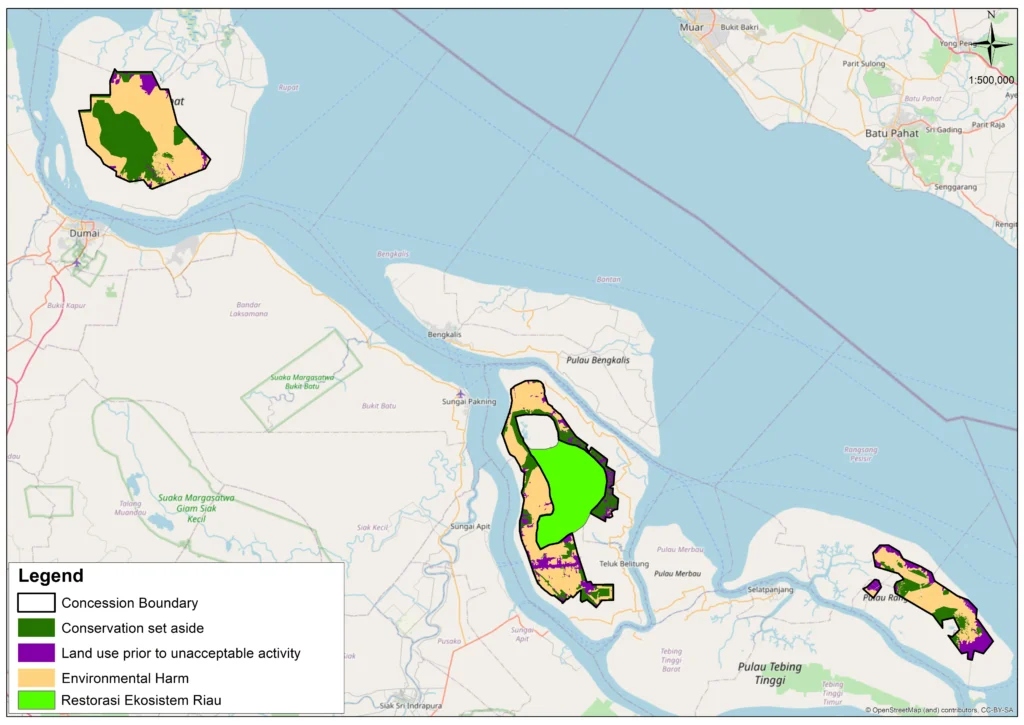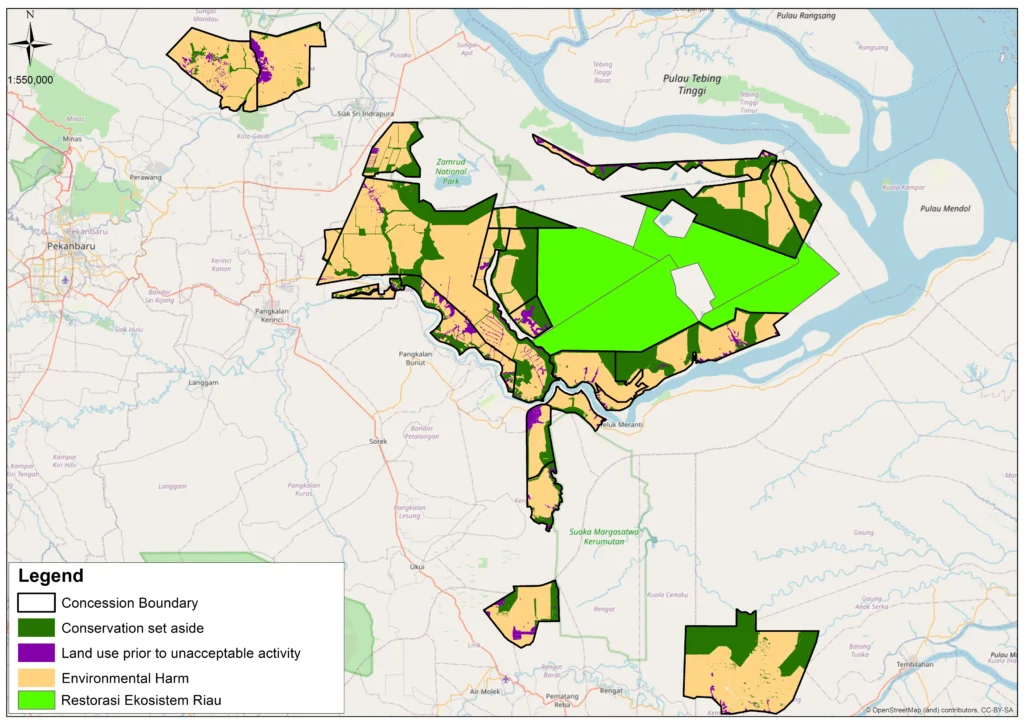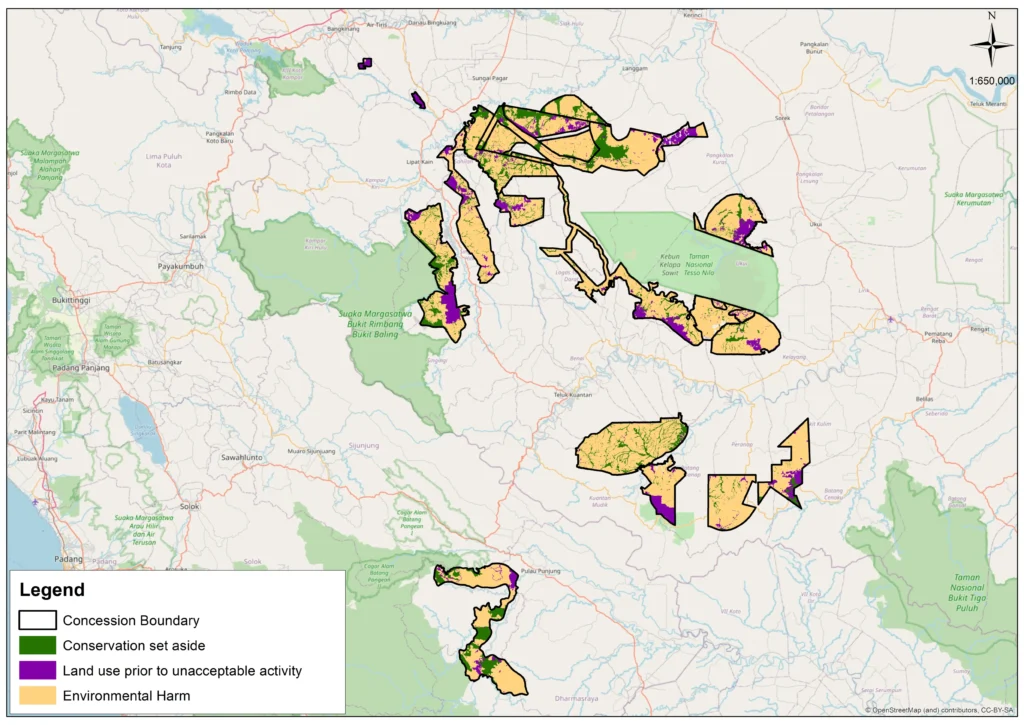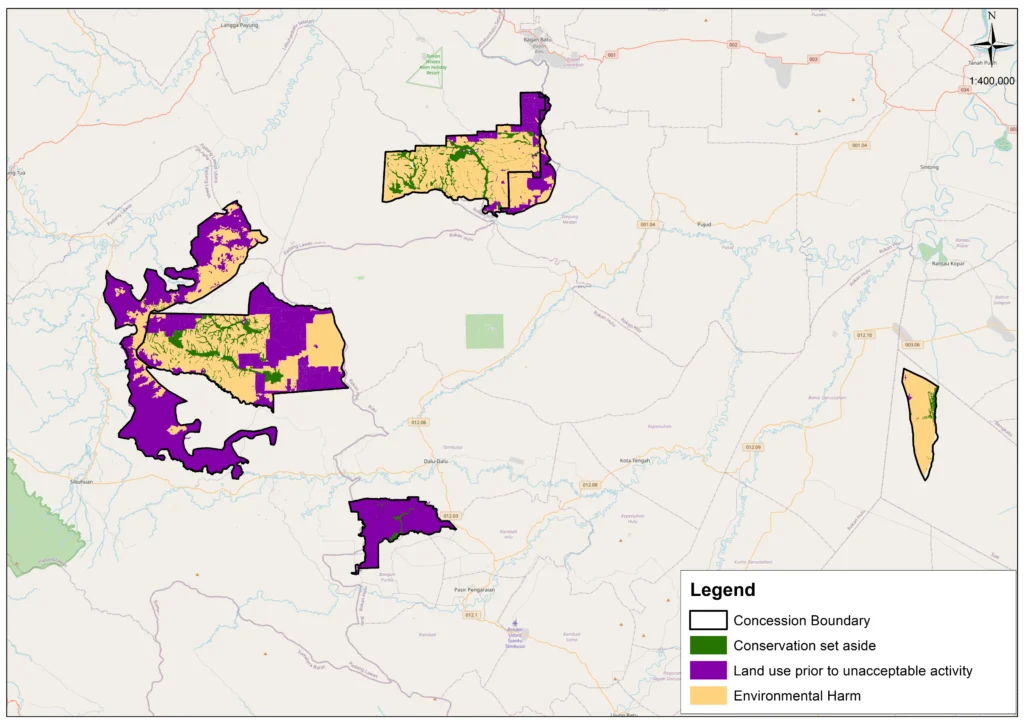Concessions within the RIAU Impact Area
Progress update for RIAU Impact Area
Phase 1
Status: In Progress
Identifying past environmental and social harm
Please refer to the FAQ section for questions regarding the progress of APRIL remedy and association process.
Environmental and Social Baseline Assessment in Riau
PT Hatfield Indonesia (PTHI), contracted by FSC, was tasked with conducting both the Environmental Baseline Assessment (EBA) and Desktop Social Baseline Assessment (SBA) as to identify past social and environmental harm due to unacceptable activities from 1994 – 2023 covering Riau and Kalimantan impact areas.
Socialization to village representatives were conducted between Feb – Mar 2024 as introduction of PTHI as Independent Assessor and to inform them on remedy process especially baseline assessment process that was about to commence. Following this, PTHI held a meeting with local NGOs in Pekanbaru.
On environmental baseline assessment PTHI conducted document review complemented with spatial analysis to identify past land cover and condition of impact areas as well estimating past potential existence of high conservation values. In July 2024, PTHI held consultations with subject-matter experts as required by FSC Remedy Framework to determine any harms associated with unacceptable activities.
In September 2024, PTHI presented the EBA process to interested stakeholders via an online consultation, sharing the results of the baseline analysis prior to the final identification of past harms. Following this consultation, PTHI submitted the EBA report to FSC, marking the completion of the baseline assessment stage in Riau.
Meanwhile for Desktop SBA, PTHI conducted document review of all information provided by internal, public, and stakeholders. Data triangulations was undertaken to refine the analysis to determine potential harms and potential impacted rights holders. The identified affected stakeholders then spatially mapped along with the impact areas.
Building on the progress and groundwork already established by PTHI, a new Independent Assessor will be appointed by FSC to continue the work on the social baseline assessment in Riau. Further updates will be provided once the new Independent Assessor has been confirmed and work resumes.
Community Awareness and Preparedness Initiatives
In parallel with the formal remedy process, since February 2024 APRIL has initiated community preparedness activities in Riau’s impact areas. These activities aim to build communities’ understanding of the FSC Remedy Framework and its implementation emphasizing communities’ roles in the process in order to participate meaningfully in the remedy process. By July 2024, APRIL completed its community preparedness program covering 257 villages across Riau.
Technical Expert Input
In August 2024, APRIL organized a Technical Expert Workshop in Jakarta, bringing together environmental and social experts—including academics, researchers, NGOs, and labor unions. This workshop sought to gather insights and recommendations to further strengthen APRIL Group’s FSC Remedy schemes.
Collaboration with PUG and FKKM Riau: Latest Developments
Since the APRIL Stakeholder Forum on the FSC Remedy Process in June 2024, APRIL has partnered with two independent organizations—Forum Komunikasi Kehutanan Masyarakat (FKKM) Riau and Patala Unggul Gesang (PUG)—to enhance the capacity and skills of affected stakeholders, enabling their effective participation in the FSC remedy process, including the application of Free, Prior, and Informed Consent (FPIC) principles. These collaborations are designed to ensure that both rights-holders and the broader impacted communities are well-informed and able to engage meaningfully in the remedy process.
Since September 2024, FKKM Riau has led a comprehensive community preparedness program in five villages across Siak, Pelalawan, Kepulauan Meranti, and Bengkalis. Their efforts focus on raising awareness about the FSC Remedy Framework, supporting communities to understand the FPIC process, and facilitating the formal documentation of grievances related to unacceptable activities.
Meanwhile, since January 2025, PUG has engaged a wide spectrum of local stakeholders—including the public, government officials, NGOs, activists, and academics—through provincial-level dialogues and awareness sessions supported by respected experts and government leaders. These efforts have fostered broad-based understanding and encouraged collaboration across the landscape.
Environmental Harm
- The Environmental Baseline Assessment is conducted using best available information and expert knowledge to determine environmental aspects associated with the unacceptable activities and any harm caused to these aspects.
- The assessment includes the condition of the impact area at the time immediately before commencement of the unacceptable activity and the current condition of the impact areas.
- The scope of the analysis covers 44 concessions located in Riau covering an area of 888,402 Hectares (Ha).
- The baseline analysis is expected to determine the environmental harm caused by the unacceptable activity and specifies the size and quality of the area and ecosystem attributes lost.
- Environmental harm* determined by Independent Assessor:
- Size of harmed area = 563,181 ha
(inclusive of estimation of potential HCV damage and loss= 413,614 ha)
- Size of harmed area = 563,181 ha
* Subject to third party verification of verifiable outcomes and processes
B. Environmental harm in Riau
Phase 2
Status: Not Started
Developing a remedy plan
Phase 3
Status: Not Started
Implementing and meeting association threshold
Phase 4
Status: Not Started







